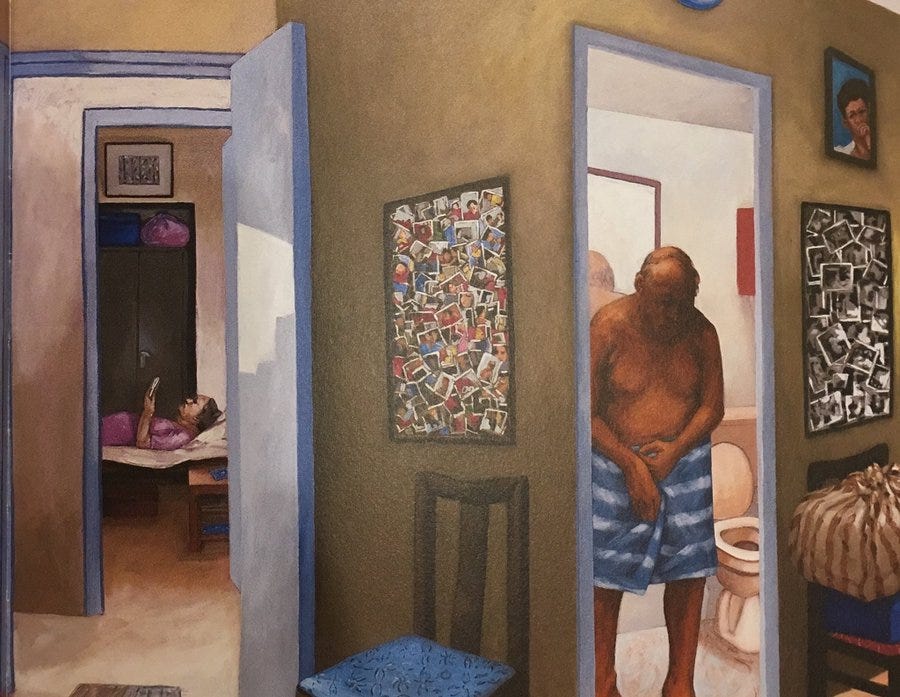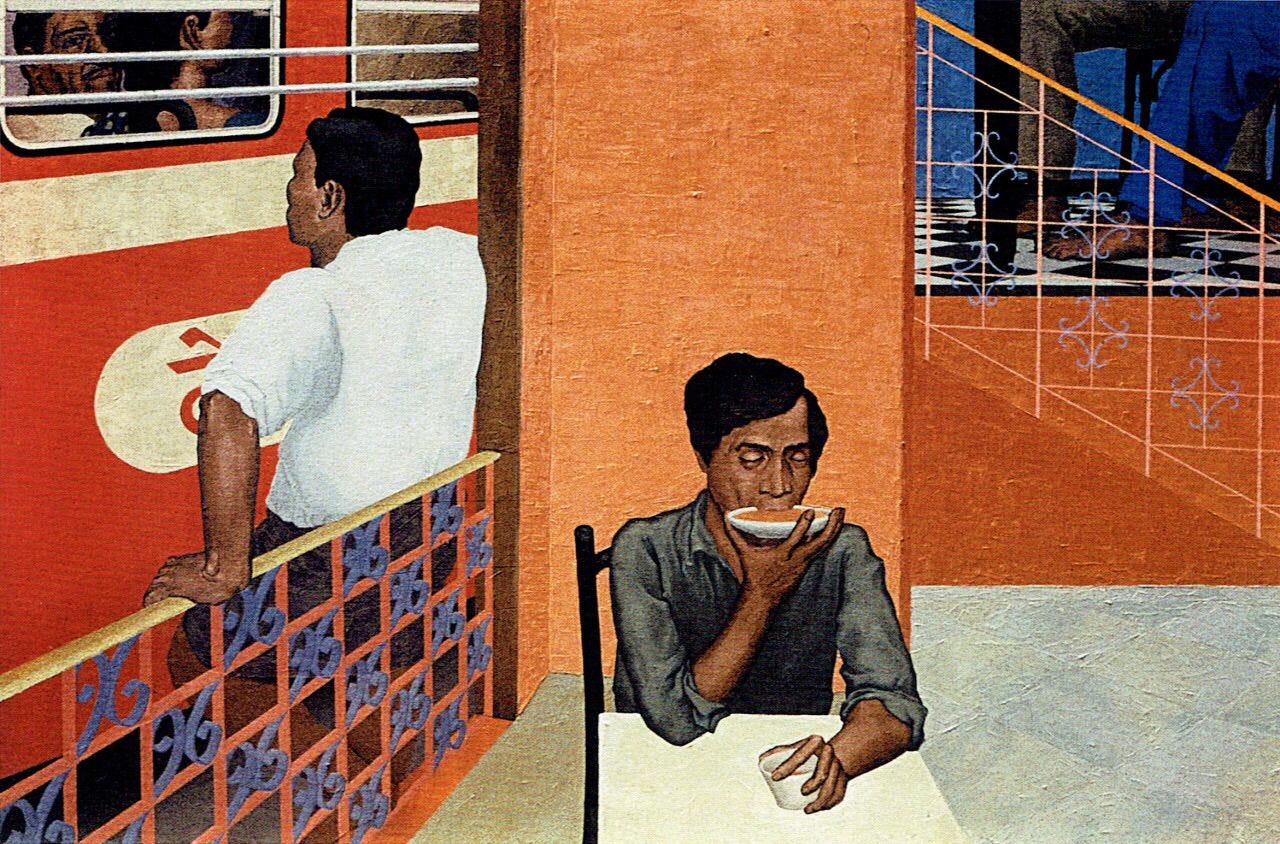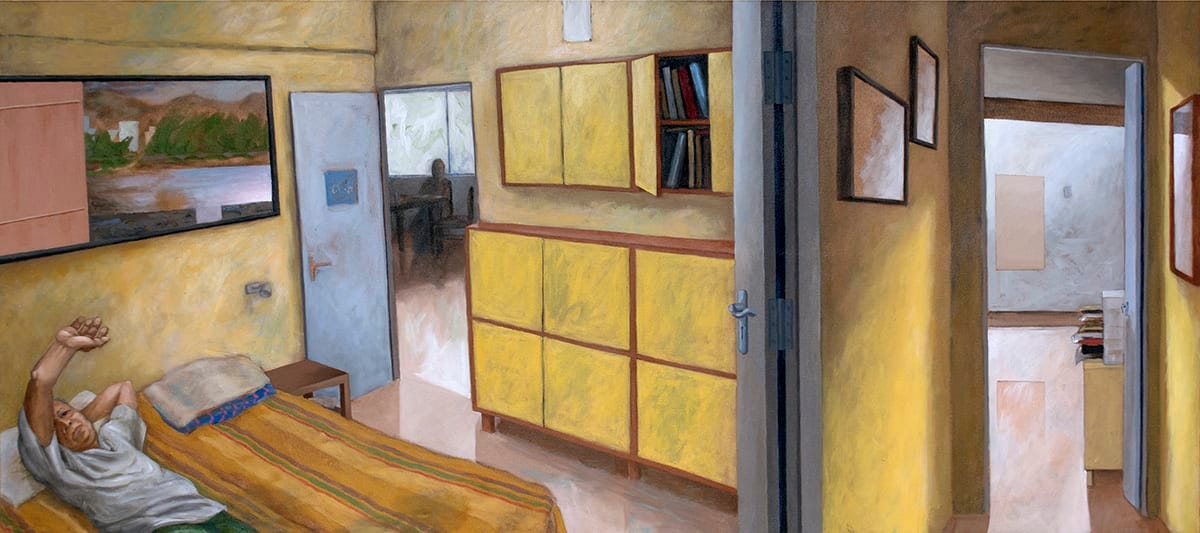Being Online, Living Online
Why on a sick weekend, I felt a stab of nostalgia for Life Before the Internet

“Home” by Sudhir Patwardhan
I’ve been sick. Which means, that more than usual, I have been reliant on the Internet as a window to what’s happening in the world, and a solace to look for something bigger. Thanks to the pandemic (which is still ongoing, FYI, in case you were misled by all those photos of picnics by your friends), our world has shrunk to sit nicely on our screen of choice. Talking to friends, online shopping, entertainment, work, creative expression, dating, just chilling – all is now mediated by Being Online.
The absurdity of just how much our world has shrunk only hits you occasionally. When you switch from scrolling Twitter on your laptop to do the same thing on your phone. When you log off from Slack for work, and then go to Instagram to “unwind after a long day of work.”
Work from home has just made things worse. Before the pandemic, at least we held on to travel and meeting friends as some sort of fragile distinction between the Online and the Offline Life. Now, work and leisure are both Online, and all of us are Googling “ways to reduce screen fatigue.” (Of course, the Internet is for wellness too, ya.)
I had a moment of “who have we become” this weekend, when I realized I had spent my entire day being sick, and being on the phone. (I know how much like an Indian parent I sound here, what to do, I am forty-five years old.)
Earlier, sick days meant I would re-read a favourite book and drink copious amounts of chai. I still drank copious amounts of chai this weekend, but instead of a book, I toggled between scrolling through Twitter, ranting to friends about being sick on Whatsapp and Instagram, and watching Micheal Jordan’s 10-episode documentary “The Last Dance” on Netflix which made me wish I played basketball.
In the middle of switching between Twitter, sending a meme to a friend on Instagram, watching the documentary, and also answering a text on Whatsapp, I suddenly felt a stab of nostalgia for life before the Internet. Or, life with the Internet – but when it was just a thing we did in life, not our entire lives.

“The City” by Sudhir Patwardhan
Like “chatting on Yahoo Messenger” was just one thing to do after school, but again, not something we did from the moment we woke up and till we slept.
Like “surfing the Internet” was a column on our daily timetables for which we gave a maximum of one hour, not a Hotel California-esque place where we just can’t leave.
Like how connecting to the Internet was a chore, which usually involved telling everyone to stay off phone lines; not something so omnipresent, that an absence of not being “connected” to the WiFi elicits frustration and anger.
Of course, like all exercises in nostalgia, this is a perspective through rose-tinted glasses. I know the Internet is a Good Thing; unthinkable innovations, democratization of cultures, a new way of being connected, all have taken place through the Internet. I also know that enough people have chosen to mindfully use the Internet; friends who aren’t on any social media platforms, and who ensure that they have rich offline lives.

“Passage” by Sudhir Patwardhan
But, still.
In an interview to Vogue, British actor and a personal favourite Olivia Colman was asked “In forty years, what do you think people will be nostalgic for?” She replies, “life before the Internet.” Except, we are seeing this nostalgia now, in 2020, through books, articles, and personal anecdotes of people logging off for days at a time.
Before Being Online became our everyday, the most exciting thing that could happen to you while “surfing the Internet” was a green dot. It meant someone was online, and it meant a world of possibilities! You could say “Hi!” You could make a new friend. You could catch-up on gossip. You could learn something new.
A green dot meant you were connected to another person, through the… Internet! People born after 2000 may not understand why I added the exclamation mark, but trust me, it was a big deal. It’s what made Being Online so shiny, new and exciting.
And then, you had to log off. Because you couldn’t be on the Internet all the time – at least, my middle-class self certainly couldn’t. So, you would type “BRB” or “TTYL” and log off; and people in your house could use phones again.
Now, though, I can’t remember the last time I typed “BRB.” And I am not alone, like the popularity of this Tumblr post attests.
To rethink Being Online often feels like a lonely attempt to go against the current – a powerful, all-encompassing current – rather than the natural course of a civilization learning to live with a new technology.
This is who we are, and, we are online, all the time.
I have used paintings by Sudhir Patwardhan, one of my favourite Indian artists of all time, but also someone who through his incredible work on urban life in India, has evoked a sense of life before the Internet in India like no other.
If you are unfamiliar with his work, this might be a good place to start to learn more about this truly brilliant artist.
Links of the Week:
You want to know a very in-demand profession right now? Butlers. That’s right. Butlers for the billionaires, to be specific. Read this piece by David Katz in GQ to know if you have what it takes to be a butler, because the money, is really good.
“A new butler willing to go east, to Shanghai or Dubai or anywhere else suffering an Anglo-servant shortage, can start at $60,000 a year and run his employer’s estate from the start. In the West, where standards are higher and the competition more fierce, a rookie typically apprentices for a few years and earns a starting salary of maybe $40,000. A butler in either market should hit six figures within five to six years—sooner if he learns a few dirty secrets or gets poached by one of his boss’s billionaire friends.”
I’m not 31 yet, but I hope to have learnt as many lessons as Madeleine Dore before hitting that age. And also, hopefully, be eloquent enough to put them down like she did here.
“Throughout my 20s, I couldn’t shake the feeling I was behind in life. I still have a habit of calculating how old someone must have been when they experienced this success or that, to figure out how I measure against them. I have to remind myself that how you measure your life is of your own making, and comparison is nothing more but the thief of joy.”
A woman in New York decides that she wants to go to sleep for a year, and then restart her life afresh. Maybe things won’t be so hard. To do this, she takes an unholy amount of drugs, but her plan, like all best plans, doesn’t work. If this two-line summary intrigued you, do read Otessa Moshfegh’s “A Year of Rest and Relaxation,” one of the best books I read last year. And eerily prescient of the #quarantinelife. Nevertheless, read this excerpt from her latest book “Death in Her Hands” — you’ll know why she is one of the most original authors you’ll read.
“Strange, strange what the mind will do. My mind, Charlie’s mind, sometimes I wondered just what the mind was, actually. It hardly made sense that it was something contained in my brain. How could I, simply by thinking that my feet were cold, be asking Charlie to shift his chin to cover them, which he did? Were we not of the same mind at such moments? And if there was a mind I shared with Charlie’s, was there a separate mind I kept for myself? Whose mind was now at work, thinking of the note, imagining, debating, and remembering things as I walked down the path through the birch trees? Sometimes I felt that my mind was just a soft cloud of air around me, taking in whatever flew in, spinning it around, and then delivering it back out into the ether.”
Rituals of mourning aid us in our journey in grief — but what happens when you can’t mourn anymore? This piece by Somya Lakhani and Tora Agarwala in The Indian Express is a heartbreaking, but an essential read.
As the days go by, Lonie says, instead of ebbing, the grief has become more severe, more painful, and sometimes, even punitive. Questions plague her the most in the quiet of the night, when everyone has gone to sleep, just around the time she would usually get a call from Julie, and she would say, in her signature singsong style, “Ki koriso, Lonz? (What are you doing?)”
That’s it from me this week. I texted a friend this weekend, “I hate being sick.” He texted back, “No one likes being sick, Maanvi.” I hope you’re doing well, and if you’re not, you have friends wry enough to get you through.
As always, I’d be happy to hear from you — after all, a pen pal was all the rage when I was growing up.
If you know someone who would like this in their inbox once-a-week, ask them to subscribe!
You can follow me on Instagram and Twitter, for books, random Bombay cinema musings, my face and some ~ opinions.
I will write again, soon.




"which made me wish I played basketball" (!!!) That's such a specific but constant feeling of internet envy.....I wish I painted..I wish I made my own pasta..I wish I was an interior designer (even though I don't really want any of those things).
But that was a really fun read!
This was a good read! :)